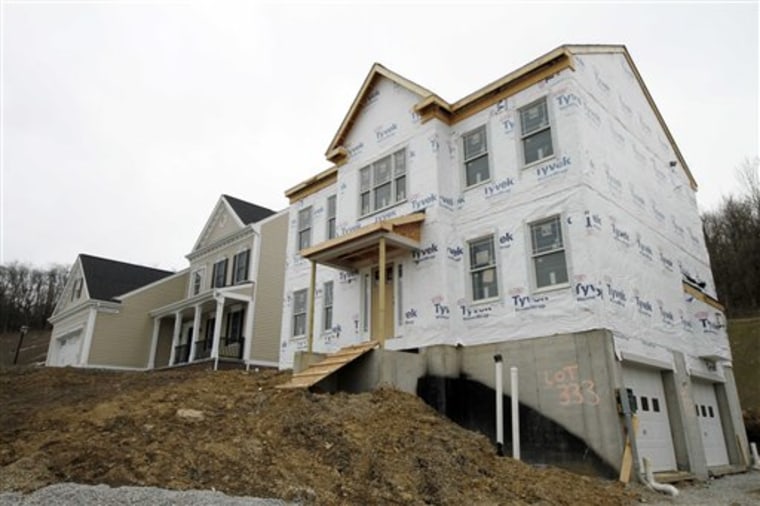Damage from the housing bust is spreading to areas once thought to be immune.
In at least 14 major U.S. metro areas, prices are now at 2003 levels — when the housing bubble was just starting to inflate. Prices will likely fall further this year, making many people reluctant to buy or sell. That would push down sales and prices more.
The depressed housing industry is slowing an economy that has shown strength elsewhere. And it's starting to hurt those who bought years before the housing boom began. In some cities, people who have paid their mortgages for a decade have little or no home equity.
Prices have tumbled in familiar troubled spots, such as Las Vegas, Cleveland and Detroit. But they're also at or near 10-year lows in Denver, Atlanta, Chicago and Minneapolis — cities that weren't as swept up in the housing boom and bust.
"It's been tough on the lower class but it's filtering up," said Paul Dales, senior U.S. economist with Capital Economics. "It may be only a matter of time before it hits the wealthy."
Just about the only major market weathering the second wave of the housing downturn is Washington. Home prices there have risen 11 percent in the past two years.
Prices fell from December to January in all but one of the 20 cities tracked by the Standard & Poor's/Case-Shiller home price index. The index, a gauge of national home prices, dipped for the sixth straight month. Prices in 11 of the cities are at their lowest point since the housing bubble burst.
The report measures prices relative to those in January 2000. For each of the 20 metro areas it studies, it provides an updated three-month average price.
"The housing market recession is not yet over, and none of the statistics are indicating any form of sustained recovery," said David M. Blitzer, chairman of the Index Committee at Standard & Poor's.
Weak home sales and falling prices are imposing a heavy burden on the economy, which has gained strength from higher consumer spending. Applications for unemployment benefits are at pre-recession lows. Manufacturing activity is growing at its fastest rate in seven years.
By contrast, sales of previously occupied homes are coming off the worst year in more than a decade. And new homes are selling at the slowest pace on records dating back to 1963.
In part, the weakening prices show how much a home-buying tax credit stimulated sales in late 2009 and early 2010. Once those tax credits expired in April, many markets began a decline that shows no sign of stopping. Some economists say the tax credits merely postponed the bottoming out that's occurring now.
Millions of foreclosures and short sales are largely to blame. Short sales occur when lenders let homeowners sell for less than they owe on their mortgage. These cut-rate sales have left a glut of discounted properties in many markets. Prices won't stop falling until they are cleared.
Even though foreclosures and short sales have created a glut of homes for sale, many of them are undesirable. The supply of homes that people actually want to buy — and can afford to — is much narrower.
"Some people who want to buy don't have the time, desire or energy to fix up a foreclosure, so they don't buy them," said Ron Shuffield, president of Esslinger-Wooten-Maxwell Realtors Inc. in Miami, where foreclosures or short sales make up two-thirds of the homes sold.
In many cases, a standoff has developed between buyers and sellers. Potential sellers are holding off putting their on the market, fearing they won't come close to getting their asking price. Buyers, seeing prices fall, are holding out for a steal.
"Buyers are coming in with low offers, and sellers are bristling at lowering their listing price," said J. Philip Faranda, who runs his own real estate firm in Westchester County, New York. "Sellers believe they already lost money with their asking price so they don't want to cut the price. They're frustrated."
The supply of homes for sale in the Minneapolis-St. Paul metro area has plummeted 26 percent over the past year, according to the Minneapolis Area Association of Realtors. And those still being sold now fetch an average of just 88 percent of the listing prices.
The Twin Cities have had price declines of 11 percent over the past six months. That's the worst among cities tracked by the home price index.
Minneapolis enjoys a strong local economy and low unemployment. But it's been beset by foreclosures and skittish home-buyers.
"We have a lot of people that own their own home, that don't have mortgages," said Brad Fisher, sales manager of Edina Realty in Minneapolis. "A lot of these people are going to hang tight and not put their foot back in the market until they feel confident."
That feeling is shared by many homeowners. More than 90 percent of homeowners now say it's a bad time to sell their home, according to a consumer confidence survey done by Reuters/University of Michigan.
Over the past year, prices for the most affordable homes have fallen by 7.5 percent, compared with a 5 percent drop for middle-tier homes and a 2.3 percent decline for the most expensive properties, according to data analyzed by Capital Economics.
Terence Avella waited three years to find a seller for his three-bedroom ranch in Chappaqua, N.Y. He bought it in 2006 for $530,000 — 18 percent less than the listing price of $650,000.
Avella, 33, won't disclose the selling price since the deal is still under contract. But it's a lot less than what he paid plus the $100,000 in improvements he's made.
"At the time, I thought it was a good deal," he said. "Now, I'm eating it."
